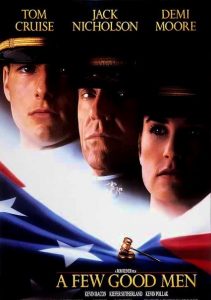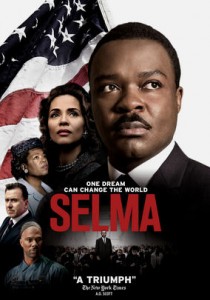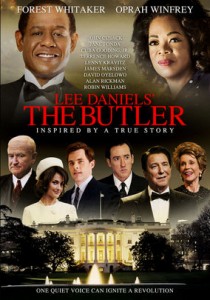A Few Good Men-1992
Director Rob Reiner
Starring Tom Cruise, Jack Nicholson, Demi Moore
Scott’s Review #1,012
Reviewed April 15, 2020
Grade: B+
A Few Good Men (1992) is a film firmly ensconced in the mainstream Hollywood courtroom drama genre.
If all the necessary elements had not been well-weaved the results might have been trite or even cringe-worthy. Nonetheless, with big stars and excellent acting, director Rob Reiner (yes, “Meathead” from All in the Family), lucks out with a predictable screenplay that compels and is made better by the sum of its parts.
The film will never bore and is a standard edge-of-your-seat thrill ride.
The drama was rewarded with several year-end niceties including nominations for the upper-crust Academy Awards. Best Supporting Actor, Best Film Editing, Best Sound Mixing, and surprisingly the lofty Best Picture statuette.
With no shame for the embarrassment of riches, deserved or undeserved is the real question, the film walked away empty-handed on Oscar night.
When cocky and handsome military lawyer Lieutenant Daniel Kaffee (Tom Cruise) and his co-counsel, Lieutenant Commander JoAnne Galloway (Demi Moore), are assigned to a murder case, their investigation uncovers a hazing ritual that could implicate high-ranking officials.
U.S. Marines Lance Corporal Harold Dawson (Wolfgang Bodison) and Private First Class Louden Downey (James Marshall) are facing a general court-martial, accused of murdering fellow Marine William Santiago at the Guantanamo Bay Naval Base in Cuba.
Kaffee and Galloway are to determine if higher-ranking officers orchestrated and forced the lower-ranking men to carry out a “code red” order: a violent extrajudicial punishment, and their form of justice, to kill the young victim, thus silencing him forever.
The questionable part of the plot is whether Base Camp Commander Jessup (Jack Nicholson) administered the order or instead ordered Santiago’s commanding officer, Lieutenant Jonathan James Kendrick (Kiefer Sutherland), to merely “train” Santiago to become a better Marine.
This is where the courtroom drama takes center stage with gusto.
As good as Moore, Sutherland, and Marshall are in offering compelling roles, the film belongs to Cruise and Nicholson, the veterans of the group. The best scenes come at the end of the film as Cruise and Nicholson spar in the courtroom with bombast and trickery.
Nicholson as Jessup is brooding and traditional, a lifelong military man channeling honor and dedication at any cost. Cruise as Kaffee has something to prove and wants to win at any cost. So, they tangle in a fierce machismo way.
When he catches Jessup in a lie, just like a spider captures a fly, the scenes crackle and spark with grit and energy.
The unforgettable line, “You can’t handle the truth!” is uttered by Nicholson.
A Few Good Men will both satisfy and dissatisfy those with a connection or a penchant for the military. On the one hand, the military is celebrated during the film as the need for efficiency in the world and the decorated appeal are to be admired.
But the film also stands up and questions the hypocrisy of one of the oldest establishments and its male domination and bullying methods not so different from a classic college fraternity.
The courtroom trial of a patriotic group is serious business.
While not a revolutionary film, sticking to a tried and true courtroom drama script seen in television drama series since the beginning of time, A Few Good Men (1992) provides a hefty two-hour and twenty minutes worth of pure entertainment.
Powerful acting across the board makes the film a superior experience and a thought-provoking message of whether blindly following orders without thought is still a relevant approach, not just in the military, but anywhere.
Oscar Nominations: Best Picture, Best Supporting Actor-Jack Nicholson, Best Sound, Best Film Editing



